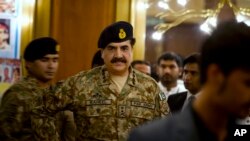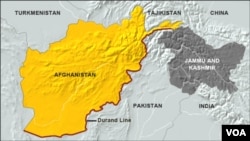Pakistan’s military chief, General Raheel Sharif, reiterated Tuesday that peace in Afghanistan was “vital” to his country’s own interest, and he called for better management of their shared border.
“We are sincerely playing our active role for peace in Afghanistan,” he told a ceremony arranged at the military’s headquarters in Rawalpindi to mark the country's annual Defense Day. Top Pakistani security officials, politicians and foreign diplomats were in attendance.
Sharif noted that “some self-seeking quarters” were obstructing Pakistan’s efforts to promote Afghan peace.
“I bear upon such elements that Afghanistan is our neighbor and brother Islamic country. Peace and stability there are vital to Pakistan’s own interest,” he said, without elaborating.
Trading accusations
Pakistani officials accuse rival India and “pro-Indian elements,” particularly within the Afghan security establishment, of hampering efforts Islamabad has been making to end the Afghan conflict and improve ties with Kabul.
Afghan leaders, however, dismiss those assertions as unfounded, and in turn accuse the Pakistan military and its spy agency of covertly supporting and providing sanctuary to Taliban insurgents who are fighting to overthrow the internationally backed Afghan government.
Pakistani authorities reject the charges and blame the nearly 2,600-kilometer largely porous border, called the Durand Line, for encouraging militant infiltrations on both sides. Relations between Pakistan and Afghanistan have lately deteriorated over mutual allegations of supporting terrorist acts on each other's soil.
Afghan officials again pointed fingers at Pakistan for Monday’s deadly bombings in Kabul that left more than 35 people dead and about 150 wounded. The Taliban claimed responsibility for the violence.
In a veiled reference to the neighboring country, Afghan Chief Executive Abdullah Abdullah, while condemning the bloodshed, asserted Tuesday that Afghans were fighting a war against terrorists “who are trained, advised, supported and instructed in our neighborhood.”
New immigration gates
In his Tuesday speech, Sharif asserted that recent Pakistan army-led security operations near the Afghan border had uprooted terrorist infrastructures, and he emphasized the need for better management of what he referred to as the international border with Afghanistan to sustain those gains.
“We want to establish an effective border management mechanism in concert with the Afghan government. I am certain that a better peace environment will lead to our shared economic progress,” the general said.
But the Afghan government has objected and even condemned new Pakistani constructions at the border, because Kabul traditionally disputes and does not recognize the Durand Line as an international boundary.
Pakistani officials dismiss those objections and have lately stepped up the process of building new immigration gates, security outposts and small forts along the border, saying these measures will effectively address mutual concerns of militant infiltrations on either side.





